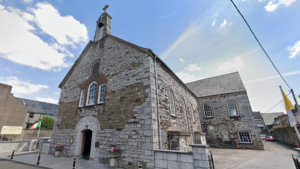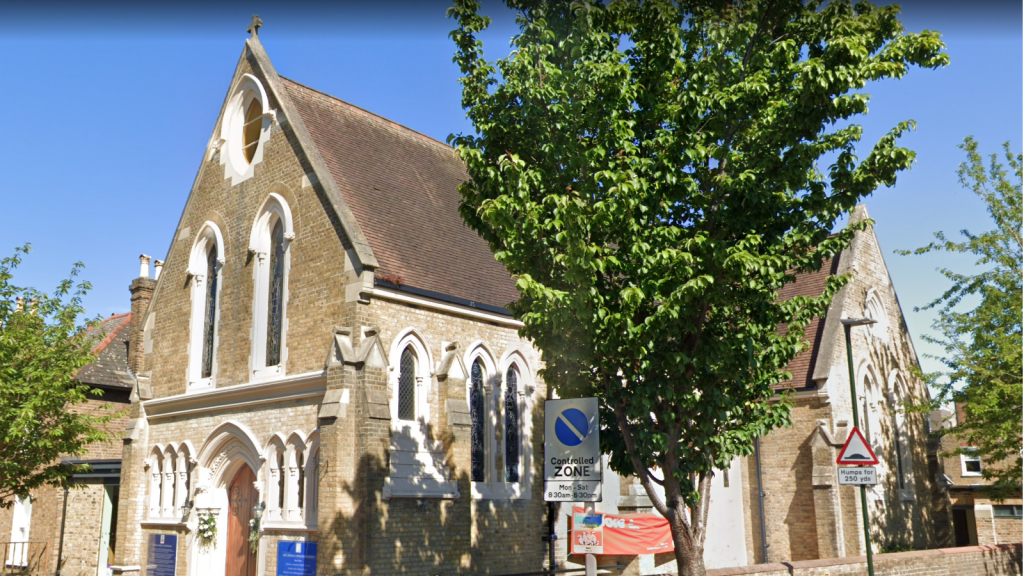Churches of the Day
Pictorial Thought for Today
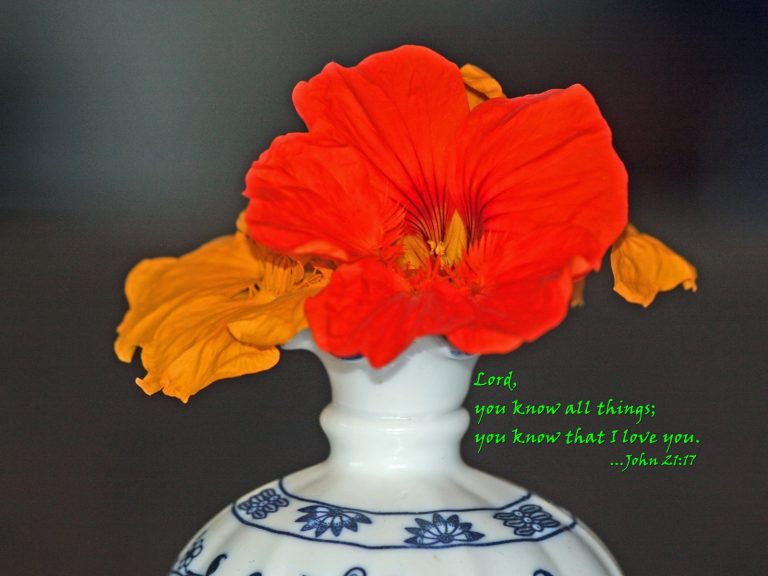
Apr 25 - St Mark (Evangelist,1st Century)
Patrick Duffy reviews what is known about him.
Identification with John Mark
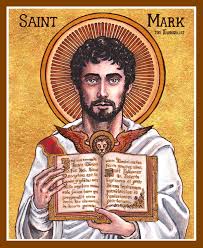 Traditionally, Mark is identified with the young man described in Mk 14:51 who followed Jesus when he was arrested: "He had nothing on but a linen cloth; they caught hold of him, but he left the cloth in their hands and ran away naked". He is also mentioned in Acts 12:12 when Peter escaped from prison: "He went straight to the house of Mary the mother of John Mark in Jerusalem, where a number of people had assembled and were praying". In Acts 12:25 John Mark accompanies Paul and Barnabas from Jerusalem to Antioch and goes on with them to Cyprus (13:5), but for some reason he went back from there to Jerusalem (13:13).
Traditionally, Mark is identified with the young man described in Mk 14:51 who followed Jesus when he was arrested: "He had nothing on but a linen cloth; they caught hold of him, but he left the cloth in their hands and ran away naked". He is also mentioned in Acts 12:12 when Peter escaped from prison: "He went straight to the house of Mary the mother of John Mark in Jerusalem, where a number of people had assembled and were praying". In Acts 12:25 John Mark accompanies Paul and Barnabas from Jerusalem to Antioch and goes on with them to Cyprus (13:5), but for some reason he went back from there to Jerusalem (13:13).Violent Quarrel with Paul
Paul did not appreciate this and refused to take John Mark with him on his second missionary journey (Acts 15:38). After a violent quarrel Barnabas went with John Mark to Cyprus (Acts 15:39) while Paul took Silas as his companion to Asia Minor (Acts 15:40). Later Paul and John Mark were reconciled (Col 4:10 and 1 Tim 4:11).
Disciple of Peter
However, another tradition coming from a fragment of Papias of Hierapolis (2nd century AD) and quoted by the historian Eusebius (263–339) in his Church History III.39 sees Mark as a disciple of Peter who based his gospel - or at least the first draft of it - on what he learned from Peter:
"Mark having become the interpreter of Peter, wrote down accurately whatever he remembered. It was not, however, in exact order that he related the sayings or deeds of Christ. For he neither heard the Lord nor accompanied Him. But afterwards, as I said, he accompanied Peter, who accommodated his instructions to the necessities [of his hearers], but with no intention of giving a regular narrative of the Lord's sayings. So Mark made no mistake in writing some things in this way as he remembered them. For of one thing he took especial care, not to omit anything he had heard, and not to put anything fictitious into the statements. Matthew put together the oracles [of the Lord] in the Hebrew language, and each one interpreted them as best he could."
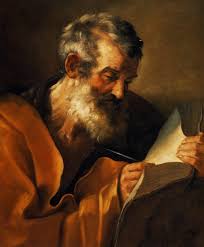
Peter refers to Mark affectionally as his "son" (1 Pet 5:13). Both Saints Irenaeus and Clement of Alexandria mention that association.
Death at Alexandria
According to Eusebius and the prologue to the ancient Latin version of St Mark's Gospel, Mark died at Alexandria. The Divine Liturgy of St. Mark is the ancient, traditional main Liturgy of the Orthodox Church of Alexandria.
Patron of Venice
Early in the 9th century Mark's body was brought to Venice, where he is patron saint of the city and cathedral even to this day. The basilica there contains his relics and a series of mosaics on Mark's life, death and the bringing of his remains to Venice.
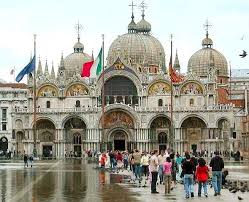
St Mark, Evangelist
FIRST READING
A reading from the first letter of St Peter 5:5-14
Bow down, then, before the power of God now, and he will raise you up on the appointed day
To the rest of you I say: do what the elders tell you, and all wrap yourselves in humility to be servants of each other, because God refuses the proud and will always favour the humble. Bow down, then, before the power of God now, and he will raise you up on the appointed day; unload all your worries on to him, since he is looking after you

Be calm but vigilant, because your enemy the devil is prowling round like a roaring lion, looking for someone to eat. Stand up to him, strong in faith and in the knowledge that your brothers all over the world are suffering the same things. You will have to suffer only for a little while: the God of all grace who called you to eternal glory in Christ will see that all is well again: he will confirm, strengthen and support you. His power lasts for ever and ever. Amen.
I write these few words to you through Silvanus, who is a brother I know I can trust, to encourage you never to let go this true grace of God to which I bear witness. Your sister in Babylon, who is with you among the chosen, sends you greetings; so does my son, Mark.
The Word of the Lord Thanks be to God.
Responsorial Psalm Ps 88
Response I will sing for ever of your love, O Lord.
Or Alleluia!
1. I will sing for ever of your love, O Lord; through all ages my mouth will proclaim your truth.
Of this I am sure, that your love lasts for ever,
that your truth is firmly established as the heavens. Response
2. The heavens proclaim your wonders, O Lord; the assembly of your holy ones proclaims your truth.
For who in the skies can compare with the Lord or who is like the Lord
among the sons of God? Response
3. Happy the people who acclaim such a king, who walk, O Lord, in the light of your face,
who find their joy every day in your name,
who make your justice the source of their bliss. Response
Gospel Acclamation Ps 118: 29
Alleluia, Alleluia!
We are preaching a crucified Christ, who is the power and the wisdom of God.
Alleluia!
GOSPEL
A reading from the holy Gospel according to Mark 16:15-20
Jesus final words: Go out to the whole World and proclaim the Good News to all creation.
Jesus said to the Eleven,
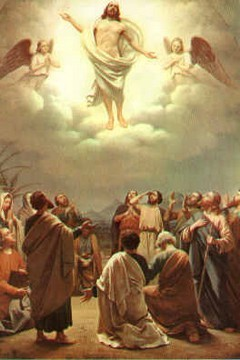
'Go out to the whole world; proclaim the Good News to all creation.
He who believes and is baptised will be saved; he who does not believe will be condemned.
These are the signs that will be associated with believers:
in my name they will cast out devils; they will have the gift of tongues;
they will pick up snakes in their hands, and be unharmed should they drink deadly poison;
they will lay their hands on the sick, who will recover.'
And so the Lord Jesus, after he had spoken to them, was taken up into heaven: there at the right hand of God he took his place, while they, going out, preached everywhere, the Lord working with them and confirming the word by the signs that accompanied it.
The Gospel of the Lord. Praise to you, Lord Jesus Christ.
Gospel Reflection 25 April Feast of Saint Mark Mark 16:15-20
Mark was the first to write a gospel. It always strikes me as strange that the gospel reading for his feast is taken from the longer ending of Mark which was probably a later addition to the gospel! According to early tradition, Mark was a disciple of Peter, which accounts for the first reading being from the first letter of Peter.
Mark’s gospel was the primary written source for the gospels of Matthew and Luke. In the early centuries the church seems to have found Matthew’s gospel in particular more helpful for the life of faith because of the large amount of the teaching of Jesus it contains, relative to Mark. As a result, Mark’s gospel was overshadowed somewhat in the early centuries by its larger relations, especially Matthew, and also John. Yet, without Mark’s gospel the church would not have had the gospels of Matthew or Luke in the form that they have come down to us.
In time, Mark came to be appreciated on its own terms, and not just as a poorer version of Matthew. It is now recognized for the wonderful literary and theological masterpiece it is. Mark portrays Jesus as the suffering Son of Man who came not to be served but to serve, and who was ready to lay down his life in the service of all. Mark’s portrait of the disciple mirrors that of Jesus. As disciples we are called to walk in the way of Jesus’ self-emptying service of God and God’s people, even when that means travelling the way of the cross. Mark is often unsparing in his portrayal of the failure of the disciples to imbibe this vision of Jesus and to live by it. Jesus struggles to open their eyes. As the gospel progresses, their failure become more pronounced, until, at the end, ‘they all deserted him and fled’.
Yet the gospel ends (the shorter ending) with the young man calling on the faithful women to tell the other disciples that Jesus is going ahead of them to Galilee where they will see him. The risen Lord remains faithful to his failed disciples and his faithfulness finally allows them to see clearly and to go out afresh to preach the gospel. This faithfulness of the Lord is well expressed in today’s gospel reading, ‘the Lord working with them confirming the word by the signs that accompanied it’. This message of Mark’s gospel that the Lord continues to work with his disciples, in spite of past serious failings, is a message the church needs to hear today
__________________________________
The Scripture Readings are taken from The Jerusalem Bible, published 1966 by Darton, Longman & Todd Ltd. and used with the permission of the publishers. http://dltbooks.com/
The Scripture Reflection is made available with our thanks from his book Reflections on the Weekday Readings 2024: The Word is near to you, on your lips and in your heart by Martin Hogan and published by Messenger Publications 2022/23, c/f www.messenger.ie/bookshop/
____________________
Sliocht as Litir Naomh Peadar 5:5-14
Beannaíonn Marcas, mo mhac, daoibh.
Cuirigí umaibh, gach duine agaibh, an umhlaíocht i leith a chéile, mar “cuireann Dia in aghaidh lucht an uabhair, ach bronnann sé a ghrásta ar lucht na humhlaíochta.”
Umhlaígí sibh féin dá bhrí sin faoi láimh chumhachtach Dé ionas go n-ardódh sé sibh i dtráth.

Caithigí bhur gcúram go léir suas air, óir tugann sé aire daoibh.
Bígí measartha agus déanaigí faire, mar tá bhur n-áibhirseoir, an diabhal, ag gabháil timpeall mar a bheadh leon ag búiríl ar thóir dhuine éigin le slogadh. Seasaigí an fód ina aghaidh agus sibh daingean sa chreideamh, agus a fhios agaibh go bhfuil sé i ndán do bhur mbráithre ar fud an domhain na nithe céanna a fhulaingt. Ansin, Dia na ngrást uile a ghlaoigh oraibh chun a ghlóire féin I gCríost, nuair a bheidh an beagán fulaingthe agaibh, déanfaidh sé sibh a athnuachan, a dhaingniú, a neartú, agus bonn a chuir fúibh.
Glóir agus réimeas dó le saol na saol. Amen.
Tá scríofa agam chugaibh i mbeagán focal le cabhair Silveánas, bráthair dílis, dar liom, á thathant oraibh agus á áiteamh oraibh gurb é seo fíorghrásta Dé; cloígí leis.
Í siúd atá sa Bhablóin, agus a toghadh faoi mar a toghadh sibhse, beannaíonn sí daoibh, rud a dhéanann Marcas mo mhac chomh maith.Beannaígí dá chéile le póg an ghrá. Síocháin daoibh uile atá i gCríost.
Briathar an Tiarna Buíochas le Dia
Psalm le Freagra Sm 88
Freagra Canfaidh mé de shíor faoi do bhuanghrá, a Thiarna
Malairt Freagra Alleluia
1. Canfaidh mé de shíor faoi do bhuanghrá, a Thiarna; fógróidh mé do dhílseacht ó ghlúin go glúin.
Óir is deimhin gur daingníodh do bhuanghrá go brách, agus shocraigh tú do dhílseacht chomh buan le neamh. Freagra
2. Foilsíonn na flaithis do mhíorúiltí, a Thiarna; tá d’fhírinne á moladh ag comhthionól na naomh.
Óir cé is cosúil leis an Tiarna sna néalta, cé atá inchurtha le Dia ar shlua na bhflaitheas? Freagra
3. Is aoibhinn don phobal arb eol dóibh an gháir áthais; siúlann siad faoi sholas do ghnúise, a Thiarna.
Déanann siad gairdeas i d’ainm feadh an lae; agus déantar a móradh as ucht d’fhíréantachta. Freagra
Alleluia Véarsa 1Coir 1:23-24
Alleluia, alleluia!
Fhógraimid Críost a céasadh. Is é Críost cumhacht Dé agus eagna Dé é.
Alleluia!
SOISCÉAL
Sliocht as an Soiscéal naofa de réir Naomh Marcas 16:15-20
Fógraígí an soiscéal don chruthaíocht uile.
San am sin dúirt Íosa lena dheisceabail :

“Imígí faoin domhan uile agus fógraígí an soiscéal don chruthaíocht uile. An té a chreidfidh agus a bhaistfear, slánófar é; ach an té nach gcreidfidh, daorfar é.
“Agus leanfaidh na comharthaí seo an dream a chreideann:
caithfidh siad deamhain amach i m’ainmse, labhróidh siad i dteangacha nua;
tógfaidh siad nathracha ina lámha, agus má ólann siad aon deoch mharfach, ní dhéanfaidh sí díobháil dóíbh; leagfaidh siad a lámha ar easláin, agus beidh siad ar fónamh.”
Tar éis dó labhairt leo, dá bhrí sin, tógadh an Tiarna Íosa suas ar neamh, agus chuaigh sé chun suite ar dheasláimh Dé.
Ach iad siúd, d’imigh siad leo agus chraobhscaoil siad i ngach áit, agus chabhraigh an Tiarna leo ag neartú an bhriathair leis na comharthaí a lean é.
Soiscéal an Tiarna. Moladh duit, a Chriost
AN BÍOBLA NAOFA
© An Sagart
The Fifth Sunday of Easter
The Church grows in the fear of the Lord, filled with the consolation of the Holy Spirit.
The Father watches over the growth of the vine that it may bear more fruit.
Faith, love and obedience to the commandments give life.
FIRST READING
A reading from the Book Acts of the Apostles 9:26-31
Barnabas explained how the Lord had appeared to Saul and spoken to him on his journey.
 When Saul got to Jerusalem he tried to join the disciples, but they were all afraid of him: they could not believe he was really a disciple. Barnabas, however, took charge of him, introduced him to the apostles, and explained how the Lord had appeared to Saul and spoken to him on his journey, and how he had preached boldly at Damascus in the name of Jesus.
When Saul got to Jerusalem he tried to join the disciples, but they were all afraid of him: they could not believe he was really a disciple. Barnabas, however, took charge of him, introduced him to the apostles, and explained how the Lord had appeared to Saul and spoken to him on his journey, and how he had preached boldly at Damascus in the name of Jesus.Saul now started to go round with them in Jerusalem, preaching fearlessly in the name of the Lord. But after he had spoken to the Hellenists, and argued with them, they became determined to kill him. When the brothers knew, they took him to Caesarea, and sent him off from there to Tarsus.
The churches throughout Judaea, Galilee and Samaria were now left in peace, building themselves up, living in the fear of the Lord, and filled with the consolation of the Holy Spirit.
The Word of the Lord Thanks be to God
Responsorial Psalm Ps 21
Response You, Lord, are my praise in the great assembly.
Or Alleluia!
1. My vows I will pay before those who fear him. The poor shall eat and shall have their fill.
They shall praise the Lord, those who seek him. May their hearts live for ever and ever! Response
2. All the earth shall remember and return to the Lord, all families of the nations worship before him.
They shall worship him, all the mighty of the earth; before him shall bow all who go down to the dust. Response
3. And my soul shall live for him, my children serve him. They shall tell of the Lord to generations yet to come,
declare his faithfulness to peoples yet unborn: 'These things the Lord has done.' Response
SECOND READING
A reading from the first letter of St John 3:18-24
His commandments are these:
that we believe in the name of his Son Jesus Christ and that we love one another.
My children,
our love is not to be just words or mere talk, but something real and active;
only by this can we be certain that we are the children of the truth
and be able to quieten our conscience in his presence,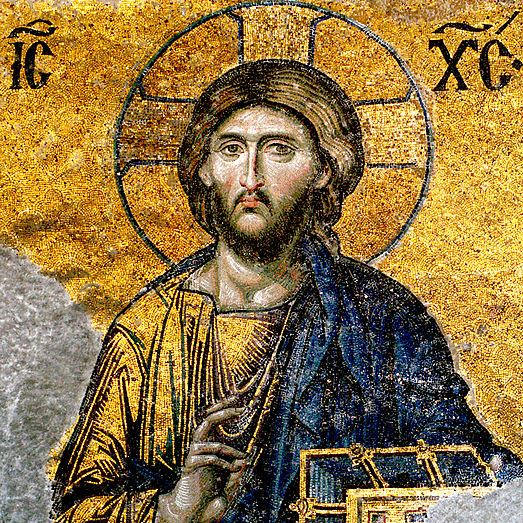
whatever accusations it may raise against us, because God is greater than our conscience and he knows everything.
My dear people, if we cannot be condemned by our own conscience,
we need not be afraid in God's presence, and whatever we ask him, we shall receive, because we keep his commandments and live the kind of life that he wants.
His commandments are these:
that we believe in the name of his Son Jesus Christ
and that we love one another as he told us to.
Whoever keeps his commandments lives in God and God lives in him.
We know that he lives in us by the Spirit that he has given us.
The Word of the Lord Thanks be to God
Gospel Acclamation Jn 14: 10
Alleluia, alleluia!
Make your home in me, as I make mine in you. Whoever remains in me bears fruit in plenty.
Alleluia!
GOSPEL
The Lord be with you And with your spirit
A reading from the holy Gospel according to John 15:10 Glory to you, O Lord
Whoever remains in me, with me in him, bears fruit in plenty.
Jesus said to his disciples:
'I am the true vine, and my Father is the vinedresser.

Every branch in me that bears no fruit he cuts away,
and every branch that does bear fruit he prunes to make it bear even more.
You are pruned already, by means of the word that I have spoken to you.
Make your home in me, as I make mine in you.
As a branch cannot bear fruit all by itself, but must remain part of the vine, neither can you unless you remain in me.
 I am the vine, you are the branches.
I am the vine, you are the branches.Whoever remains in me, with me in him, bears fruit in plenty;
for cut off from me you can do nothing.
Anyone who does not remain in me is like a branch that has been thrown away - he withers; these branches are collected and thrown on the fire, and they are burnt.
If you remain in me and my words remain in you, you may ask what you will and you shall get it. It is to the glory of my Father that you should bear much fruit, and then you will be my disciples.'
The Gospel of the Lord. Praise to you, Lord Jesus Christ
For homily resources for this Sunday's Gospel click here: https://www.catholicireland.net/sunday-homily/
Taken from THE JERUSALEM BIBLE, published and copyright 1966 by Darton, Longman and Todd Ltd and Doubleday, a division of Random House Inc, and used by permission of the publishers.
Sliocht as Leabhar Gníomhartha na nAspal 6:26-31
D'inis Barnabas do na haspail mar a chonaic Sól an Tiarna ar an tslí.
 Ar theacht dó go Iarúsailéim rinne sé iarracht ar dhul i bpáirt leis na deisceabail ach bhí eagla orthu go léir roimhe mar ní chreidfidís gur dheisceabal é. Ansin thóg Barnabas faoina chúram é agus thug i láthair na n-aspal é, ag aithris dóibh conas mar a chonaic sé an Tiarna ar an mbóthar agus mar a rinne sé comhrá leis agus mar a labhair sé go teann in ainm Íosa i nDamaisc.
Ar theacht dó go Iarúsailéim rinne sé iarracht ar dhul i bpáirt leis na deisceabail ach bhí eagla orthu go léir roimhe mar ní chreidfidís gur dheisceabal é. Ansin thóg Barnabas faoina chúram é agus thug i láthair na n-aspal é, ag aithris dóibh conas mar a chonaic sé an Tiarna ar an mbóthar agus mar a rinne sé comhrá leis agus mar a labhair sé go teann in ainm Íosa i nDamaisc. D’fhan Sól in éineacht leo in Iarúsailéim gan chosc gan cheangal air ach é ag labhairt go dána in ainm an Tiarna. Bhíodh sé ag caint agus ag conspóid leis na Giúdaigh Heilléanacha freisin. Rinne siadsan iarracht ar é a mharú ach nuair a fuair na bráithre amach é, thóg siad Sól leo go Céasaráia agus chuir as sin go Tarsas é. Mar sin bhí síocháin ag an Eaglais ar fud Iúdáia go léir agus na Gailíle agus na Samáire. Lean sí á tógáil féin agus ag dul chun cinn faoi eagla an Tiarna agus ag dul i méid le cabhair an Spioraid Naoimh.
Briathar an Tiarna Buíochas le Dia
Salm le Freagra Sm 21
Freagra Is tú mo mholadh sa mhórthionól, a Thiarna.
Malairt Freagra Alleluia!
I. Comhlíonfaidh mé mo mhóideanna i láthair na droinge ar a mbíonn a eagla.
Íosfaidh na bochtáin agus beidh a sáith acu. Molfaidh lucht a iarrtha an Tiarna.
Go maire a gcroíthe go brách na breithe. Freagra
2. Cuimhneoidh an domhan uile agus casfaidh ar an Tiarna, agus adhrfaidh na ciníocha uile ina fhianaise.
Adhrfaidh maithe móra an talaimh ina fhianaise. Cromfaidh ina láthair a ngabhann síos sa luaithreach. Freagra
3. Mairfidh m'anam ar a shon; déanfaidh mo chlann fónamh dó. Tabharfaidh tuairisc an Tiarna do ghlúin atá le teacht.
Foilseoidh siad a dhílseacht do phobal nár saolaíodh fós: 'Sin iad na nithe a rinne an Tiarna.' Freagra
DARA LÉACHT
Sliocht as an chéad Litir Naomh Eoin 3:18-24
Seo í an aithne a thug sé: go gcreidfimis in ainm a Mhic Íosa Críost agus go dtabharfaimis grá dá chéile.
 A chlann liom, ná tugaimis grá briathair ná cainte amháin, ach grá gnímh agus fírinne. Is mar sin a aithneoimid gur de chlann na fírinne sinn, agus is mar sin a shuaimhneoimid ár gcoinsias ina láthairsean, má chiontaíonn ár gcroí sinn. Óir gur treise é Dia ná ár gcroí-ne agus is feasach dó an uile ní.
A chlann liom, ná tugaimis grá briathair ná cainte amháin, ach grá gnímh agus fírinne. Is mar sin a aithneoimid gur de chlann na fírinne sinn, agus is mar sin a shuaimhneoimid ár gcoinsias ina láthairsean, má chiontaíonn ár gcroí sinn. Óir gur treise é Dia ná ár gcroí-ne agus is feasach dó an uile ní.A chairde cléibh, mura gciontaíonn ár gcroí sinn táimid lánmhuiníneach as Dia. Agus cibé ní a agraímid air, gheobhaimid uaidh é, ó tharla go gcoinnímid a aitheanta agus go ndéanaimid beart de réir a thaitnimh. Agus seo í an aithne a thug sé: go gcreidfimis in ainm a Mhic Íosa Críost agus go dtabharfaimis grá dá chéile, de réir mar a d’ordaigh seisean dúinn. An té a choinníonn a aitheanta, maireann i nDia, agus maireann seisean ann. Agus is mar seo a aithnímid go maireann sé ionainn, tríd an Spiorad a thug sé dúinn.
Briathar an Tiarna Buíochas le Dia
Alleluia Véarsa Eo 15: 4-5
Alleluia, Alleluia!
'Fanaigí ionamsa, agus mise ionaibh,' a deir an Tiarna.
'An té a fhanann ionamsa, tugann sé toradh mór uaidh.'
Alleluia!
SOISCÉAL
Go raibh an Tiarna libh. Agus le do spiorad féin
Sliocht as an Soiscéal naofa de réir Naomh Eoin 15:1-8 Glóir duit, a Thiarna.
An té a fhanann ionamsa, agu mise ann, tugann sé toradh mór uaidh
San am sin dúirt Íosa lena dheisceabail:
Mise an fhíniúin fhíor, agus is é m’Athair an saothraí.
Gach géag ionam nach dtugann toradh, bainfidh sé í;
agus gach géag a thugann toradh, ionas go dtabharfaidh sí breis toraidh.
Tá sibhse bearrtha de bharr an bhriathair a labhair mé libh.
Fanaigí ionamsa, agus mise ionaibh. Faoi mar nach féidir don ghéag
toradh a thabhairt uaithi féin, mura bhfanann sí san fhíniúin,sin mar nach féidir daoibhse, mura bhfanann sibh ionamsa.

Mise an fhíniúin, sibhse na géaga; an té a fhanann ionamsa, agus mise ann,
tugann seisean toradh mór uaidh; óir gan mise, ní féidir daoibh aon ní a dhéanamh.
Cibé nach bhfanfaidh ionamsa, caithfear amach é mar ghéag, agus feofaidh sé;
agus tógfar agus caithfear sa tine iad, agus dófar iad.
Má fhanann sibh ionamsa agus má fhanann mo bhriathra ionaibh,
iarrfaidh sibh cibé ní is mian libh agus déanfar daoibh é.
Tugadh glóir do m’Athair sa mhéid go dtugann sibhse toradh mór uaibh,
agus go mbeidh sibh in bhur ndeisceabail agamsa.
Soiscéal an Tiarna. Moladh duit, a Chriost
************************************
Machtnamh ar Bhriathar Dé dia 5ú Domhnach na Cásca
Cén fáth go bhfuil gá le bearradh
Tá fhios ag na daoine a chothaionn rósanna go gcaithfear na plandaí a bearradh gach blian más mian leo fás maith a bheith iontu. Is fíor sin don chuid is mó de plandaí mar an chéanna; cabhraíonn an bhearradh leis an shaol nua. Tagraíonn Íosa le bearradh sa soiscéal inniú. Tugann sé le fios go ndéanann Dia bearradh ar ár saol ó am go h’am, chun iad a dhéanamh níos fiúnta ná mar atá siad faoi láthair. Tá roinnt rudaí ann a gur chóir a dhíbirt, má’s mian linn bheith cóir i láthair Dé. Thárlódh sé go mba thairfí an rud é scaoileadh le rudaí áirithe , cé gur leasg linn ag an am, a cabhródh linn cur len ár gcaidreamh le Dia agus le daoine eile. Nuair a déantar an bearradh seo is giorra dúinn bíonn an Tiarna, i bhfocail an tsoiscéil, déanann sé cónái linn. Ní gá dúinn a bheith ag brath ar ár neart féin. Nuair a bhíonn an Tiarna ag cur faoi ionainn bíonn Sé taobh linn, rud a thugann saol nua níos torthúla dúinn. Ach chun go dtarlódh seo ní mór dúinn fanacht in a láthair mar a fhanann sé linne.
Pádraig Ó Rúairí, cp,
Sliabh Argus, Átha Cliath.
********************************************
AN BÍOBLA NAOFA
© An Sagart



